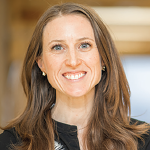As the new chair of the Pediatric Rheumatology Special Committee, Colleen Correll, MD, MPH, assistant professor of pediatric rheumatology, University of Minnesota, Minneapolis, will lead the committee through its next chapter of supporting and advancing clinical care, research, education and advocacy for children and teens diagnosed and living with rheumatologic conditions. Dr. Correll talked with The Rheumatologist about her involvement with the committee and her aims as chair going forward. She also shared her general thoughts on pediatric rheumatology and its current challenges.

Dr. Correll
The Rheumatologist (TR): Why did you choose to get involved with the Pediatric Rheumatology Special Committee?
Dr. Correll: When I was invited to become a member of the Pediatric Rheumatology Special Committee, I really did not know much about who was on the committee at the time nor what the major role was for committee members. I attended the ACR annual meetings and was involved in the AMIGO program, which pairs pediatric rheumatology mentors and mentees across institutions and across the U.S. to support fellows and junior faculty through their early careers as pediatric rheumatologists. But beyond that didn’t know a lot about the ACR. I was honored to be invited to be a committee member, and I wanted to know more about how I could support my colleagues through the position in the ACR.
TR: Now as chair of the committee, what are your plans and goals for the committee over the next year or two?
Dr. Correll: From a personal standpoint, I have two major goals: The first is to increase the pediatric rheumatology workforce, and the second is to increase pediatric rheumatology representation throughout the ACR. I would [also] love to hear from members of the committee to learn what we as a group think is best to prioritize.
TR: What are some of the major challenges facing pediatric rheumatology that you would like to see addressed?
Dr. Correll: A major challenge is increasing our pediatric rheumatology workforce. The supply of pediatric rheumatologists already does not meet the demand of children with rheumatic disease, and this is especially true in parts of the country where patients have to travel many hours to see a pediatric rheumatologist. There are several states with no pediatric rheumatologists and others with only one or two. The 2015 ACR workforce study showed that this supply-and-demand issue is only going to worsen as many pediatric rheumatologists begin to retire. To date, we do not have enough incoming pediatric rheumatologists to fill this gap.
The ACR recognizes this issue and has made addressing both adult and pediatric workforce issues a priority. I am part of the newly developed ACR Workforce Solutions Committee, which is developing several innovative strategies to increase the training of new pediatric rheumatology providers and to support existing providers to improve barriers to care.
TR: What are some of the advances in the field that have improved the lives of children with rheumatic conditions?
Dr. Correll: Major advances in the field include new safe and effective treatments. The options for treatments continue to grow for juvenile idiopathic arthritis, systemic lupus erythematosus and many other pediatric rheumatic diseases. Especially for juvenile idiopathic arthritis, we now have several treatment options from which to choose, and in most circumstances our expectation is that children will have an excellent prognosis.
TR: Tell us about yourself.
Dr. Correll: I am a pediatric rheumatologist in Minnesota and, up until a few years ago, our catchment area for patients was very large; we treated patients from all over Minnesota, North and South Dakota, western Wisconsin and parts of Iowa. Some patients would travel 10 or more hours to see us. I’m pleased that in my geographic area, the workforce has increased and there are now two pediatric rheumatologists in North Dakota. However, many parts of the country continue to be underserved, due to both geography and the lack of supply.
TR: For some background, how did you get into rheumatology? What in particular interested you in pediatric rheumatology?
Dr. Correll: I was always interested in immunology and how the immune system works. I had very little exposure to pediatric rheumatology in medical school and during early residency, so I did not initially consider pediatric rheumatology, but was considering a fellowship in allergy and immunology. However, in my third year of pediatrics residency, I completed a rotation in pediatric rheumatology and fell in love with the field. I loved the interesting cases involving a variety of autoimmune diseases, the thoughtfulness that rheumatologists have and the continuity of care with patients.
Mary Beth Nierengarten is a freelance medical journalist based in Minneapolis.


